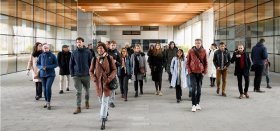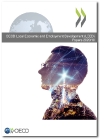Local Employment and Economic Development (LEED Programme)
OECD EURADA Winter School for Regional Development Agencies
|
|
|
Material & informationAgenda & Proceedings
The programme of the Winter School is aimed at officials from national and regional Development Agencies and/or students or other professionals interested and active in socio economic development. Participants should be strongly committed to local development, innovation and/or the development and implementation of EU R&I and/or Cohesion policies.
Registration for the online workshops was separate from the registration for the Winter School. Please note that non-EURADA members who attended both online workshops were entitled to a reduced fee for the Winter School. Winter School Candidates for the Winter School needed to submit a duly compiled application. Candidates could propose a topic for a pitch on one of the themes of the Winter School. Priority was given to EURADA members. If the number of applications exceedsed the number of places available, the participants were selected on the basis of professional level and work experience. Online workshops Attendance via registration. Places were limited.
There was a participation fee for the Winter School. The organisers covered transport, lunches, and dinner during the Winter School, whereas travel to Utrecht and accommodation costs will be borne by the participants. The two online workshops were free of charge.
Working language English. Contacts OECD Trento Centre EURADA
|
||
Partners
 |
Previous edition
|
|
2023 Focus: Smart Specialisation for competitiveness, sustainability and resilient local development Smart Specialisation strategies if well designed, implemented and monitored, can help build resilience at local level, address societal challenges and contribute to the achievement of sustainability goals. The three main themes of the Winter School were the following:
The Winter School combined presentations with hands-on and practice oriented approach, which helped participants to comprehend better the challenges and opportunities for local development. Substantial time during each day was reserved for field visits, case pitches and peer-learning to promote exchange of practices. The Winter School included interactive presentation sessions, discussions, group exercises and field visits in Trentino, Italy (onsite). The Winter School allowed participants to get a better understanding of local development challenges, meet and learn from their peers, as well as network and establish new working relationships. |
Previous OECD related work
|
Webinar | 28 June 2021 |
The Internationalisation of Smart Specialisation Strategies The OECD Trento Centre for Local Development and the Autonomous Region of Friuli Venezia Giulia in Italy, developed a project on local development and internationalisation of the innovation system in Friuli Venezia Giulia. The project devotes specific attention to the regional S3 and its future evolution, in view of the 2021-2027 EU programming cycle. This international webinar focused on the opportunities and challenges posed by S3 internationalisation. Building on the Friuli Venezia Giulia case study, the webinar offered an opportunity to compare national, regional and international methodologies, practices and experiences. |
Report | 30 November 2021
|
Related Documents



